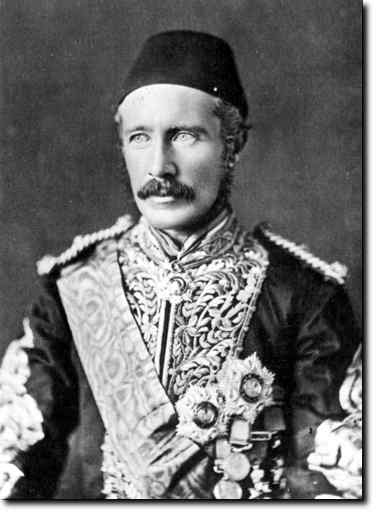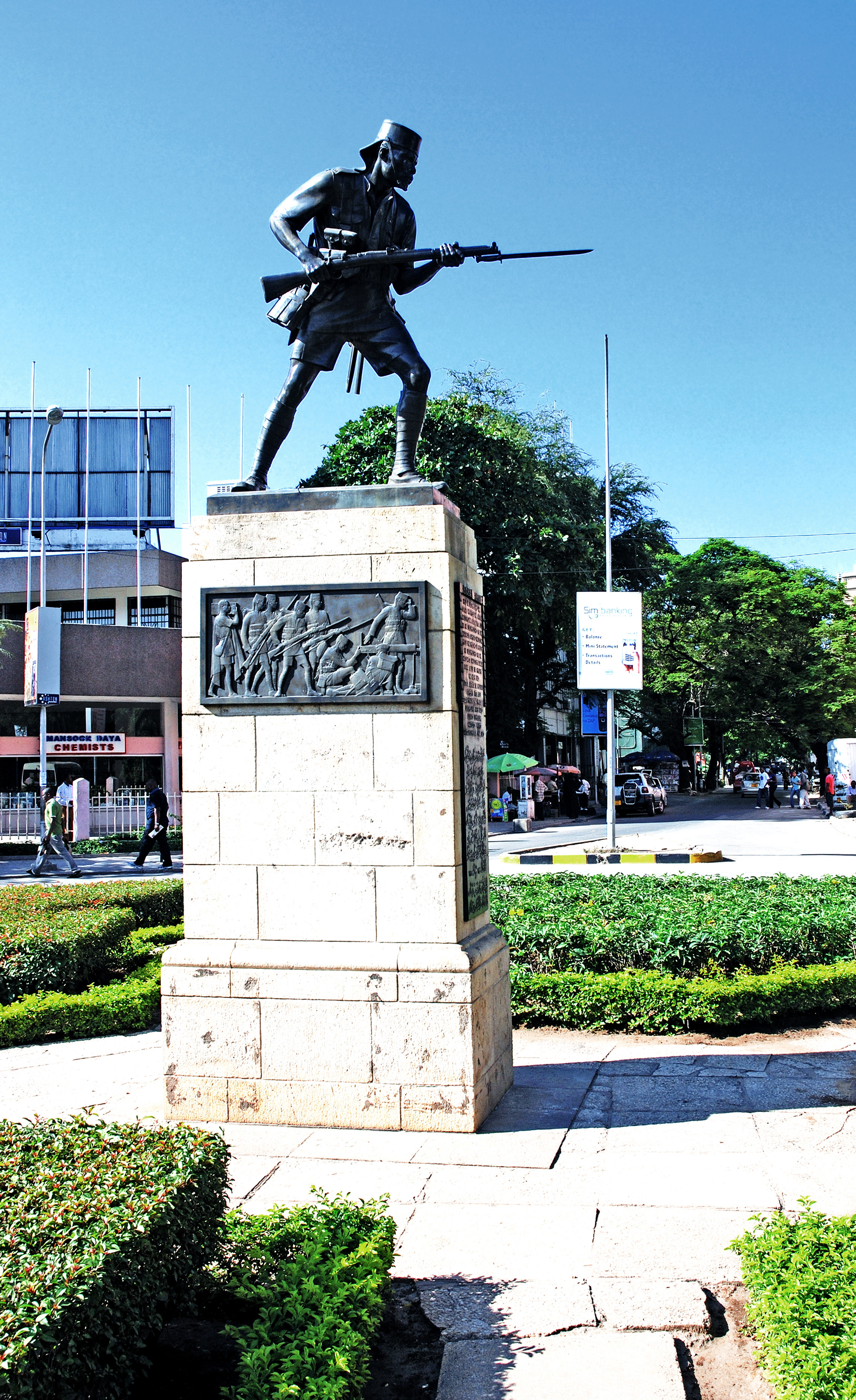|
First Battle Of Agordat
The First Battle of Agordat, which took place on 27 June 1890 was the first battle between Italy and the Mahdist State. Fighting began when a force of one-thousand Mahdists attacked tribes that had signed protectorates with the Kingdom of Italy. The Sudanese continued on to the wells at Agordat, where they were met by two companies of Italian-led ascari. The battle that ensued was an Italian victory, with around 250 Mahdists being killed. Italian losses were three dead and eight wounded. Author Sean McLachlan attributes the Mahdists' defeat at both Agordat and the upcoming Battle of Serobeti (1892) to their "inferior weaponry and fire discipline". References {{coord missing, Eritrea 1890 in Sudan 1890 in the Italian Empire Agordat Agordat Agordat Agordat Agordat Agordat (also spelled Akordat or Ak'ordat) is a city in Gash-Barka, Eritrea. It was the capital of the former Barka Province, which was situated between the present-day Gash-Barka and Anseba regions. History ... [...More Info...] [...Related Items...] OR: [Wikipedia] [Google] [Baidu] |
Mahdist War
The Mahdist War (; 1881–1899) was fought between the Mahdist Sudanese, led by Muhammad Ahmad bin Abdullah, who had proclaimed himself the "Mahdi" of Islam (the "Guided One"), and the forces of the Khedivate of Egypt, initially, and later the forces of Britain. After four years, the Mahdist rebels overthrew the Ottoman-Egyptian administration with the fall of Khartoum and gained control over Sudan. The Mahdist State launched several unsuccessful invasions of their neighbours, expanding the scale of the conflict to also include the Italian Empire, the Congo Free State and the Ethiopian Empire. They also faced significant internal rebellion. Anglo-Egyptian forces reconquered Sudan in 1898 and the Mahdist state collapsed following defeat at the battle of Omdurman. The last organised resistance from the Mahdists ended the next year, leading to the creation of Anglo-Egyptian Sudan (1899–1956), a ''de jure'' condominium of the British Empire, and the Kingdom of Egypt, in which ... [...More Info...] [...Related Items...] OR: [Wikipedia] [Google] [Baidu] |
Agordat
Agordat (also spelled Akordat or Ak'ordat) is a city in Gash-Barka, Eritrea. It was the capital of the former Barka Province, which was situated between the present-day Gash-Barka and Anseba regions. History Agordat was historically a key center along the old caravan trade route connecting eastern and northern Sudan to Eritrea, due to its strategic location near the Barka River. During the period of Funj hegemony in Sudan, the nabtab became the ruling class of the Beni-Amer, with their center established around Agordat. It was from the Funj that the vassal Beni-Amer chief, the ''diglal'', received his emblem of rank and authority. His permanent camp was located a few kilometers from what is now the town of Agordat. Although the diglal's growing power was weakened by the Mahdist invasion between 1885 and 1893, he remained in control of the region. In June 1890, an Italian military expedition, which had already built a small fort near Agordat, allied itself with the Beni-Am ... [...More Info...] [...Related Items...] OR: [Wikipedia] [Google] [Baidu] |
Italian Eritrea
Italian Eritrea (, "Colony of Eritrea") was a colony of the Kingdom of Italy in the territory of present-day Eritrea. The first Italian establishment in the area was the purchase of Assab by the Società di Navigazione Rubattino, Rubattino Shipping Company in 1869, which came under government control in 1882. Occupation of Massawa in 1885 and the subsequent Italo-Ethiopian War of 1887–1889, expansion of territory would gradually engulf the region and in 1889 the Ethiopian Empire recognized the Italian possession in the Treaty of Wuchale. In 1890 the Colony of Eritrea was officially founded. In 1936 the region was integrated into Italian East Africa as the Eritrea Governorate. This would last until Italy's loss of the region in 1941, during the East African campaign (World War II), East African campaign of World War II. Italian Eritrea then came under #British Military Administration and the end of the colony, British military administration, which in 1951 fell under United Nation ... [...More Info...] [...Related Items...] OR: [Wikipedia] [Google] [Baidu] |
Mahdist State
The Mahdist State, also known as Mahdist Sudan or the Sudanese Mahdiyya, was a state based on a religious and political movement launched in 1881 by Muammad Ahmad bin Abdullah, Muhammad Ahmad bin Abdullah (later Muhammad Mahdi, al-Mahdi) against the Khedivate of Egypt, which had ruled Sudan since 1821. After four years of struggle, the Mahdist rebels overthrew the Ottoman Empire, Ottoman-Egyptian administration and established their own "Islamic and national" government with its capital in Omdurman. Thus, from 1885 the Mahdist government maintained sovereignty and control over the Sudanese territories until its existence was terminated by the Anglo-Egyptian Sudan, Anglo-Egyptian forces in 1898. Mohammed Ahmed al-Mahdi enlisted the people of Sudan in what he declared a jihad against the administration that was based in Khartoum, which was dominated by Egyptians and Turks. The Khartoum government initially dismissed the Mahdi's revolution. He defeated two expeditions sent to capture ... [...More Info...] [...Related Items...] OR: [Wikipedia] [Google] [Baidu] |
Askari
An askari or ascari (from Somali, Swahili, and Arabic , , meaning 'soldier' or 'military', also 'police' in Somali) was a local soldier serving in the armies of the European colonial powers in Africa, particularly in the African Great Lakes, Northeast Africa and Central Africa. The word is used in this sense in English, as well as in German, Italian, Urdu, and Portuguese. In French, the word is used only in reference to native troops outside the French colonial empire. The designation is still in occasional use today to informally describe police, gendarmerie and security guards. During the period of the European colonial empires in Africa, locally recruited soldiers designated as askaris were employed by the Italian, British, Portuguese, German and Belgian colonial armies. They played a crucial role in the conquest of the various colonial possessions, and subsequently served as garrison and internal security forces. During both World Wars, askari units also served outside ... [...More Info...] [...Related Items...] OR: [Wikipedia] [Google] [Baidu] |
Battle
A battle is an occurrence of combat in warfare between opposing military units of any number or size. A war usually consists of multiple battles. In general, a battle is a military engagement that is well defined in duration, area, and force commitment. An engagement with only limited commitment between the forces and without decisive results is sometimes called a skirmish. The word "battle" can also be used infrequently to refer to an entire operational campaign, although this usage greatly diverges from its conventional or customary meaning. Generally, the word "battle" is used for such campaigns if referring to a protracted combat encounter in which either one or both of the combatants had the same methods, resources, and strategic objectives throughout the encounter. Some prominent examples of this would be the Battle of the Atlantic, Battle of Britain, and the Battle of France, all in World War II. Wars and military campaigns are guided by military strategy, whereas battl ... [...More Info...] [...Related Items...] OR: [Wikipedia] [Google] [Baidu] |
Kingdom Of Italy
The Kingdom of Italy (, ) was a unitary state that existed from 17 March 1861, when Victor Emmanuel II of Kingdom of Sardinia, Sardinia was proclamation of the Kingdom of Italy, proclaimed King of Italy, until 10 June 1946, when the monarchy was abolished, following civil discontent that led to an 1946 Italian institutional referendum, institutional referendum on 2 June 1946. This resulted in a modern Italian Republic. The kingdom was established through the unification of several states over a decades-long process, called the . That process was influenced by the House of Savoy, Savoy-led Kingdom of Sardinia (1720–1861), Kingdom of Sardinia, which was one of Italy's legal Succession of states, predecessor states. In 1866, Italy Third Italian War of Independence, declared war on Austrian Empire, Austria in Italo-Prussian Alliance, alliance with Kingdom of Prussia, Prussia and, upon its victory, received the region of Veneto. Italian troops Capture of Rome, entered Rome in 1870, ... [...More Info...] [...Related Items...] OR: [Wikipedia] [Google] [Baidu] |
Battle Of Serobeti
The Battle of Serobeti took place on June 26, 1892, and was fought between Italy and the Mahdist State. The incident took place when one-thousand Mahdist warriors entered Italian Eritrea and were driven back by an Italian-led force of 120 ascari and 200 Baria tribe warriors. In all, Italian losses were three dead and ten wounded, while the Mahdists suffered around one-hundred killed and wounded. Author Sean McLachlan blames the Mahdists' "inferior weaponry and fire discipline" for their defeat at Serobeti and the preceding First Battle of Agordat (1890). Background The First Battle of Agordat made Muhammad Ahmad's followers more cautious. The Emir of Cassala had threatened to take revenge for the battle, but besides a few other small raids, would hesitate to commit to a major action. Meanwhile, the Italians had occupied Agordat as their outpost, building a fort to defend and garrison it with a company of askari. The Italian victory at Agordat, the completion of the fort and hir ... [...More Info...] [...Related Items...] OR: [Wikipedia] [Google] [Baidu] |
1890 In Sudan
Year 189 ( CLXXXIX) was a common year starting on Wednesday of the Julian calendar. At the time, it was known as the Year of the Consulship of Silanus and Silanus (or, less frequently, year 942 ''Ab urbe condita''). The denomination 189 for this year has been used since the early medieval period, when the Anno Domini calendar era became the prevalent method in Europe for naming years. Events By place Roman Empire * Plague (possibly smallpox) kills as many as 2,000 people per day in Rome. Farmers are unable to harvest their crops, and food shortages bring riots in the city. China * Liu Bian succeeds Emperor Ling, as Chinese emperor of the Han dynasty. * Dong Zhuo has Liu Bian deposed, and installs Emperor Xian as emperor. * Two thousand eunuchs in the palace are slaughtered in a violent purge in Luoyang, the capital of Han. By topic Arts and sciences * Galen publishes his ''"Treatise on the various temperaments"'' (aka ''On the Elements According to Hippocrate ... [...More Info...] [...Related Items...] OR: [Wikipedia] [Google] [Baidu] |
Battles Of The Mahdist War
A battle is an occurrence of combat in warfare between opposing military units of any number or size. A war usually consists of multiple battles. In general, a battle is a military engagement that is well defined in duration, area, and force commitment. An engagement with only limited commitment between the forces and without decisive results is sometimes called a skirmish. The word "battle" can also be used infrequently to refer to an entire operational campaign, although this usage greatly diverges from its conventional or customary meaning. Generally, the word "battle" is used for such campaigns if referring to a protracted combat encounter in which either one or both of the combatants had the same methods, resources, and strategic objectives throughout the encounter. Some prominent examples of this would be the Battle of the Atlantic, Battle of Britain, and the Battle of France, all in World War II. Wars and military campaigns are guided by military strategy, whereas batt ... [...More Info...] [...Related Items...] OR: [Wikipedia] [Google] [Baidu] |






